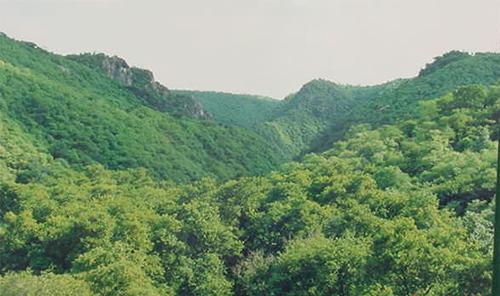How the State is Plundering People’s Spaces, in India and the World

Image Courtesy: Haryanaforest.gov.in
The Haryana government has diverted 79.44 square kilometres of forests—equivalent to 20% of Delhi’s geographical area—for the purposes other than forest. The trees have been cut down to build infrastructure and other industrial projects. Strangely enough the same government has now asked for a grant from the Centre to plant trees under an afforestation drive.
The states of Haryana, Telangana, Madhya Pradesh, Odisha and Maharashtra, between 2014-15 and 2016-17, diverted 560.69 square kilometres of forest area—as large as the size of Pondicherry—for non-forest purposes.
Forests, and for that matter other utilities that belong to the ‘Commons’, are being handed over to the private sector in India at a rapid space—the trend picking up since the 1990s. This apparently is happening across the globe.
Interestingly, some 800 years ago in the England of 1217, a document sealed at the behest of King Henry III went on to become the foundation of the constitutions of the UK, the US as well as several other countries. The document came to be famously called the Magna Carta. But along with it was the less popular Forest Charter.
The British, while monopolising their control over Indian forests in 1865, introduced the Forests Rights Act in 1865. Even back then, the rights of the traditional forest communities were secured under a provision named the Wazi Wul Urge. The rights of the forest communities were restricted but registered. These included their right to grazing animals and access to fodder, fuel and timber for house construction. Although it was an attack on the Commons, the British were not able to completely snatch their rights away.
The Commons amounts to the rights of the people over land, water and forest. In the cities, commons applies to open spaces that are so very important for securing a livelihood. The Commons is an ancient social form that has survived for centuries, constantly renewing itself. It can be seen in indigenous agriculture and community forests, Bolivian water committees, theatre commons and the Burning Man festival.
But there has been a systematic abuse of the Commons across the globe, especially under neoliberal capitalism. What we are witnessing now is large scale privatisation of land, water and other public utilities.
Rising private riches is linked to declining public wealth which includes shrinking of the Commons. In contemporary times, as the riches of a minority elite grow, their ability to deprive the majority of the commons is strengthened. The Paris-based World Inequality Lab has stated in its 2017 report that the period since the ’90s has seen a tremendous rise in unequal distribution of wealth.
According to them, the Commons have been robbed. Professor Guy Standing, of London university’s School of Oriental and Africa Studies, has given a vivid description of the Commons at the World Economic Forum (WEF).
According to Standing, the main means by which the Commons have been historically shortchanged is via enclosure, the process of lending private property to commercial use.
A modern phenomenon has been the commercialisation of Commons, partially or wholly, for instance, by charging fees for using a park or turning it into an area for commercial ‘events’.
A third means has been shrinkage by deliberate neglect, often a prelude to privatisation, and so eroding appreciation and use of a Commons until there is weakened interest in preserving it. Neglect has been widespread in the austerity era; public spending cuts have left the Commons exposed to hasty privatisation, to raise funds needed to fill fiscal holes left by tax cuts for the wealthy.
In India, the stream is no different. In fact, under the present dispensation, the pace of privatisation of the Commons has been rapid.
The country is witnessing a new phenomenon of privately-owned public spaces (POPS). There are innumerable examples in the cities where common land, such as a park or a playground, has been taken over by the city or the state administration to build a shopping complex or a big mall.
It is unbelievable but it is true that in a city like Gurgaon, which has a population of over 2 million, the open spaces for the young to play are completely missing. A badminton court has been developed by a private entrepreneur, which should have been constructed and run by the city administration instead.
There was an effort recently to completely privatise the greenest meadow in Shimla called the Annandale ground. It is still not open for the people (as it is under the Indian Army’s control) but, in the guise of public utility, it was being taken over by the cricket association which wanted to turn it into a cricket stadium—a highly privatised space.
Similarly, the water in the cities, which happen to be one of the most important Commons, is being privatised on the pretext of improving efficiency. Water is being considered a need and not a right. The need can be met even with a private player in the market. The government is actually abdicating its responsibility of providing the same.
Another important feature of the depletion of the Commons is the constantly shrinking space for pedestrians and cyclists, especially in the metros. Though the roads are being widened but the space of the two most important commuters has been robbed.
Even the space of ‘Commons participation’ , in planning and democracy, is under severe threat. Despite the fact that the 74th Constitutional amendment provided for a greater participatory role of the elected institution at the city level, the tasks of the amendment (participatory democracy) continue to remain a distant dream.
The new Smart City project, which is opting to use special purpose vehicles (SPVs) to implement projects, is further robbing the ‘Commons democracy’, handed it over to another power structure which doesn’t guarantee participatory decision making.
What’s happening, hence, is not just the robbing of the material Commons in the form of land, water and forests. Even intellectual wisdom earned during the evolutionary process is under threat.
What we need is a global information campaign on the value of the Commons. To put it in Guy’s words, “The changes will not come without concerted public pressure, for which resources and courageous backing are needed. If the plunder is allowed to continue, Margaret Thatcher’s infamous quip that ‘there is no such thing as society’ could come dangerously close to reality.”
Get the latest reports & analysis with people's perspective on Protests, movements & deep analytical videos, discussions of the current affairs in your Telegram app. Subscribe to NewsClick's Telegram channel & get Real-Time updates on stories, as they get published on our website.






















